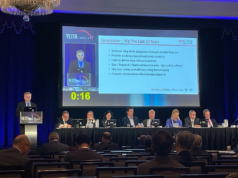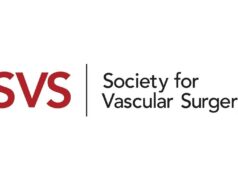 In June, the most read stories from Vascular Specialist included key reports from the 2024 Vascular Annual Meeting (VAM; June 19–22) covering TEVAR, CEA vs TCAR, PAD and CFA-reintervention, among others; Linda Harris’ placement as SVS vice president; the relationship between patient selection and carotid stenting volume and outcomes, and several more.
In June, the most read stories from Vascular Specialist included key reports from the 2024 Vascular Annual Meeting (VAM; June 19–22) covering TEVAR, CEA vs TCAR, PAD and CFA-reintervention, among others; Linda Harris’ placement as SVS vice president; the relationship between patient selection and carotid stenting volume and outcomes, and several more.
1. Linda Harris elected SVS vice president
The Society for Vascular Surgery (SVS) has announced Linda Harris, MD, as its next vice president, meaning that she enters the presidential line and will become SVS leader in 2026.
2. VAM 2024: Paper exploring stroke rates in arch TEVAR emerges as winner of Poster Competition
The 2024 VAM annual meeting in Chicago showcased emerging talent in vascular surgery through a moderated Poster Competition held over two days of the conference. This event provided a platform for research and recognized excellence among the next generation of vascular surgeons.
3. ‘We are in this together’: SVS president set to issue call for vascular surgery unity amid tensions of modern medicine
SVS President Joseph Mills, MD, is set to issue a rallying call steeped in classical history and decades of collected vascular surgery wisdom in order to bring the specialty together for a common purpose: to overcome “unrest” and to drive forward vascular care.
4. CEA vs TCAR: Surgeons should be familiar with both procedures and ‘collaborate as needed’
When it comes to the ongoing debate of carotid endarterectomy (CEA) versus transcarotid artery revascularization (TCAR) in the treatment of carotid artery stenosis, operators should be comfortable and maintain experience with both of these procedures—and “collaborate as needed.”
That is the ultimate finding of a registry analysis set to be presented later this week at the 2024 VAM annual meeting in Chicago during Plenary Session 1: William J. von Liebig Forum.
5. Young vascular surgeons on the PAD frontier: ‘This is the time to seize the day,’ 2024 Veith Lecturer declares
Huge opportunities abound for vascular surgeons to take a leadership role on the frontlines of a developing peripheral arterial disease (PAD) treatment crisis in the U.S., said Michael Conte, MD, as he gave the second annual Frank J. Veith Distinguished Lecture on the closing day of the 2024 Vascular Annual Meeting.
6. TCAR and endarterectomy both ‘reasonable’ but stenting linked to worse outcomes in kidney disease patients
A study examining outcomes between different carotid revascularization procedures has concluded that transcarotid artery revascularization (TCAR) and carotid endarterectomy (CEA) both represent a “reasonable choice” in severe chronic kidney disease (CKD) and hemodialysis patients—but transfemoral carotid artery stenting (TF-CAS) appears more likely to result in worse outcomes.
7. VAM 2024: Putting out the fires of intraoperative vascular emergencies
A VAM 2024 Education Session taking place on Wednesday, June 19, examined the most common emergency intraoperative vascular surgery consultations, along with trends in intraoperative vascular surgery consultation over time—the subject area that has seen vascular surgeons referred to as the firefighters of the operating room (OR).
8. Patient selection may explain ‘counterintuitive’ relationship between carotid stenting volume and outcomes in new study
High stroke and death rates relating to carotid stenting in the Pacific Northwest may be driven by the selection of high-risk patients with less than 80% stenosis, and reducing the frequency of stenting in this high-risk group—along with better adherence to guideline-recommended medical management—could improve regional outcomes.
9. New data on TAMBE outcomes in complex aortic aneurysms
The US Food and Drug Administration (FDA)-approved Gore Excluder Thoracoabdominal Branch Endoprosthesis (TAMBE) has been shown to be safe and effective at 30 days for the treatment of patients with complex aortic aneurysms involving the visceral aorta.
10. Endovascular CFA treatment associated with increased rate of long-term CFA-specific reintervention, study finds
A recent study suggests that endovascular treatment of the common femoral artery (CFA) is associated with an increased rate of long-term CFA-specific reintervention, regardless of indication. Nicholas Wells, MA, a medical student at Yale School of Medicine in New Haven, Connecticut, presented this and other key findings from a tertiary care center analysis of open and endovascular treatment of the CFA during yesterday’s William J. von Liebig Forum at VAM 2024.












